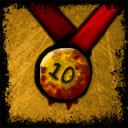Steam 설치
로그인
|
언어
简体中文(중국어 간체)
繁體中文(중국어 번체)
日本語(일본어)
ไทย(태국어)
Български(불가리아어)
Čeština(체코어)
Dansk(덴마크어)
Deutsch(독일어)
English(영어)
Español - España(스페인어 - 스페인)
Español - Latinoamérica(스페인어 - 중남미)
Ελληνικά(그리스어)
Français(프랑스어)
Italiano(이탈리아어)
Bahasa Indonesia(인도네시아어)
Magyar(헝가리어)
Nederlands(네덜란드어)
Norsk(노르웨이어)
Polski(폴란드어)
Português(포르투갈어 - 포르투갈)
Português - Brasil(포르투갈어 - 브라질)
Română(루마니아어)
Русский(러시아어)
Suomi(핀란드어)
Svenska(스웨덴어)
Türkçe(튀르키예어)
Tiếng Việt(베트남어)
Українська(우크라이나어)
번역 관련 문제 보고


 United States
United States 



























































א (Aleph): Represents a glottal stop, like the "a" in "father."
ב (Bet/Vet): Sounds like "b" (as in "bat") or "v" (as in "vat"), depending on context.
ג (Gimel): Similar to the "g" in "go."
ד (Dalet): Like the "d" in "dog."
ה (He): Sounds like "h" (as in "hat").
ו (Vav): Similar to "v" (as in "vat") or "w" (as in "wonder").
ז (Zayin): Like the "z" in "zebra."
ח (Het): A guttural sound, similar to the Scottish "loch" or the Spanish "j" in "jalapeño."
ט (Tet): Similar to the "t" in "top."
י (Yod): Like the "y" in "yes."
כ (Kaf): Sounds like "k" (as in "kite") or "ch" (as in "loch").
ל (Lamed): Similar to the "l" in "love."
מ (Mem): Like the "m" in "mother."
Feel free to practice these sounds and explore more about biblical Hebrew! 😊📜